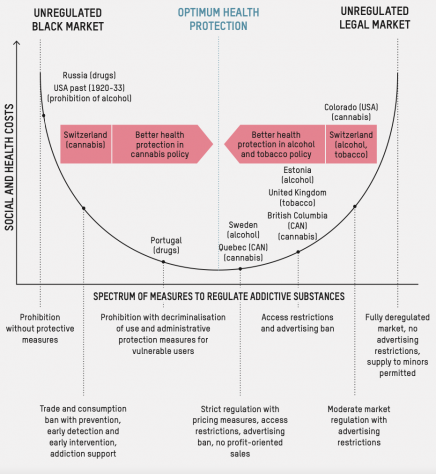_detail.png?lm=1702372067)
The cannabis policy in Switzerland needs to be realigned
Dec. 2023Cannabis policy – what’s next?
Leitartikel. The current ban on cannabis for non-medical use has not resulted in either a reduction in consumption or improved health protection. The Federal Council is in favour of an evidence-based evolution of the cannabis policy. It recommends imposing strict conditions on legal distribution because this must not lead to the commercialisation and promotion of consumption.
The current situation regarding the way cannabis is handled in Switzerland is frequently described as unsatisfactory. Stakeholders in a number of fields – the scientific community, the health authorities, those working in the judicial system and addiction experts – share this opinion. As does the Federal Council.
The situation is unsatisfactory on many levels. Although cannabis containing one per cent (or more) of THC continues to be banned in Switzerland, consumption is stagnant at a high level. Consumption is particularly widespread among adolescents and young adults. This age group is especially at risk, yet can easily obtain cannabis on the black market. At the same time, the ban also criminalises low-risk adults who consume cannabis.
The black market is associated with health risks for consumers. Confiscated samples show, for example, that cannabis may be contaminated with heavy metals, mould or extenders.
Illegal sales of cannabis generate significant untaxed sales in excess of half a billion Swiss francs annually, while society foots the bill for consumption. And criminal prosecution ties up police and judicial resources.

The spectrum of measures to regulate addictive substances ranges from a ban with no measures to protect health to an unregulated legal market.The social and health costs are highest at the two extremes with an unregulated market. Show graphic
Legal situation not always comprehensible
Another unsatisfactory aspect is that the current legal situation regarding cannabis sometimes results in differing interpretations and is in some instances incomprehensible. For example, some cantons have long punished only consumption with a fine of CHF 100, while until recently others also imposed a fine on possession of small quantities. The Federal Court clarified the situation in a 2017 ruling, establishing that mere possession of up to ten grams of cannabis for personal consumption is not a punishable offence and cannot therefore be subject to a fine.
Hemp products with a THC content below one per cent are legal in Switzerland. This includes cannabidiol (CBD), which has been marketed as “cannabis light” by resourceful producers since 2016. CBD hemp can be used as a smoked tobacco substitute, but CBD drops, which are more popular and potentially less harmful, require authorisation as a novel food product or a therapeutic product if they are intended for consumption. In order to circumvent the high barriers to authorisations of this type, some manufacturers have brought their CBD products onto the market as scented oil or raw material without an intended purpose – even though the products are then frequently consumed. The cantons take action against false promotion of hemp products with varying degrees of rigour.
Parliament recognises the need for action
The partially unclear legal situation and heterogeneous enforcement in the cantons led Thomas Minder, a member of the Council of States, to propose a postulate on “Legal certainty in the production, trading and use of hemp and cannabis products” that was submitted to the Federal Council. The corresponding report was adopted by the Federal Council in November 2023. It concludes that a comprehensive hemp law covering all possible uses would not be sensible since the use of hemp extracts is already regulated in existing legislation. The report identifies legal certainty in dealing with hemp as less of a challenge than the absence of a product category for purely “recreational purposes”.
The Swiss Parliament has also recognised the need for action, and in September 2020 it approved a legal basis for the implementation of pilot trials with cannabis for recreational purposes. These shortterm studies can help to develop a way of regulating cannabis that is appropriate for Switzerland.
New regulation as an opportunity
In the context of efforts by Parliament to regulate a legal cannabis market, the Federal Council identified a possible way of implementing this idea in its report. It based its thoughts on international experience of regulating addictive substances. The spectrum ranges from strict prohibition with an uncontrolled black market to a largely liberalised market without firm measures to protect health (see illustration).
On the basis of these findings, the Federal Council came out in favour of new, evidence-based regulation of cannabis. It expressed its concern that cannabis must not be trivialised. The health risks of infrequent cannabis use are fairly low compared with other psychoactive substances, but the likelihood of mental disorders developing increases with intensive, long-term consumption. Adolescents are particularly at risk. Against this background, the Federal Council also sees a central role for youth protection. Moreover, cannabis should be neither promoted nor excessively commercialised.
Definition Cannabis sativa
Cannabis sativa – so lautet die botanische Bezeichnung der Hanfpflanze. Botanisch betrachtet ist «Hanf» und «Cannabis» das Gleiche. In der Praxis wird unterschieden zwischen THC-armem Nutzhanf zur Gewinnung von Hanfsamen und Speiseöl oder Pflanzenfasern, THC-armem Blütenhanf zur Gewinnung von Aromastoffen oder zur Herstellung von Tabakersatzprodukten (meist mit hohem CBD-Anteil) und THC-haltigem Drogenhanf oder Medizinalhanf, der auch für die Arzneimittelherstellung verwendet wird.
Rechtliche vs. botanische Definition
Während Hanf und Cannabis botanisch das Gleiche ist, gilt gemäss Betäubungsmittelrecht nur solcher Hanf als Cannabis, der ein Prozent und mehr THC enthält.
Quellen
report on the Minder postulate

_slider_small.png?lm=1702372067)


